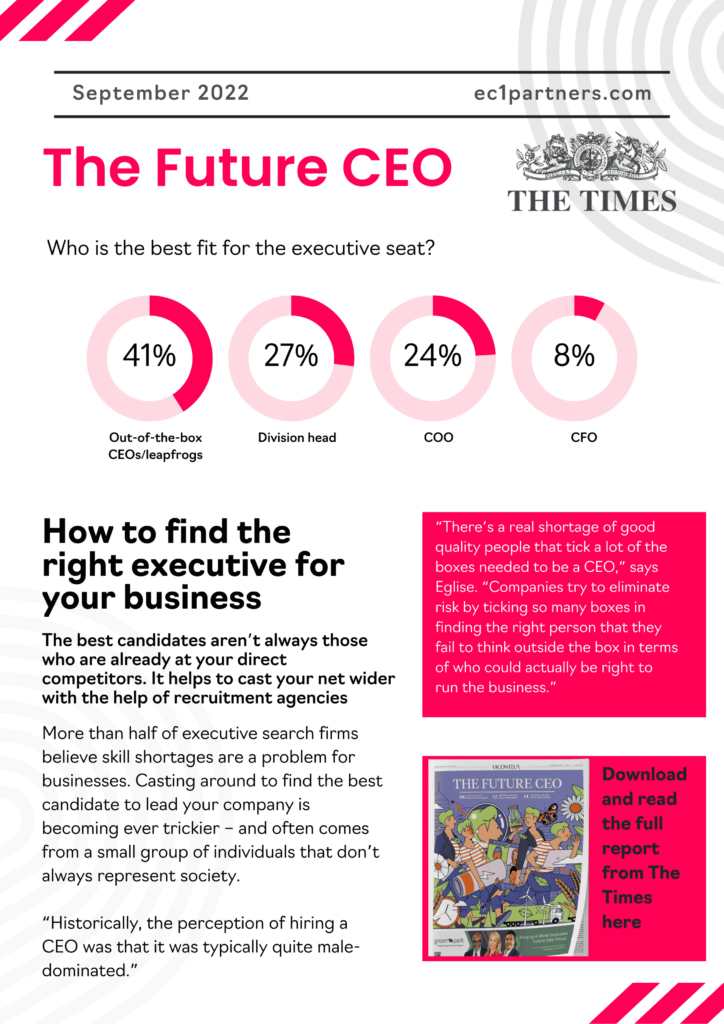More than half of executive search firms believe skill shortages are a problem for businesses. Casting around to find the best candidate to lead your company is becoming ever trickier – and often comes from a small group of individuals that don’t always represent society.
“Historically, the perception of hiring a CEO was that it was typically quite male-dominated,” says Simon Eglise, co-founder of global recruitment agency EC1 Partners, which specialises in finding leaders for fintech companies.
The problem is exacerbated in a young, fast-growing sector like fintech, where the rules of what makes a good CEO are still being drawn up. Conservative businesses tend to draw from the same pool of candidates, who invariably are leaders at direct competitors. It results in a game of musical chairs that benefits neither would-be leaders, nor the companies they’re sent in to lead.
“There’s a real shortage of good quality people that tick a lot of the boxes needed to be a CEO,” says Eglise. “Companies try to eliminate risk by ticking so many boxes in finding the right person that they fail to think outside the box in terms of who could actually be right to run the business.”
When EC1 looks for CEOs to connect with company clients, they seek out people who can set the key structural layers within a business and scale them. That includes everything from culture, vision, direction and execution. “I think a lot has moved from CEOs telling people what to do to now getting people to follow,” says Eglise. “People who have that vision are a more overriding importance than someone who has that title on their CV.”
It’s something EC1 have tackled themselves when helping clients find new CEOs for their companies. One established US fintech business that provides software to investment managers felt confident they could find a CEO for their 150-strong European team without any outside help. Their stature in the industry meant they had a deep network to tap into and a good reputation to trade on. Six months on without finding the right candidate to be their next CEO, they contacted EC1. “In a fairly short period of time, we were able to present 10 ideas – five in the typical mold, and five from the left field,” he says. They chose one from the left field selection of candidates, who they made CEO of their European operations. A year on, they’ve improved the business.
The model is one that other businesses have followed when working with EC1 to hire their next leaders, with similar successes. Though the company specialises in securing candidates for fintech companies, they’re beginning to expand further as word spreads about their success in helping businesses in one field to other areas.
Finding the right person to lead your business involves looking beyond the norms and thinking about what it is you want your executive to achieve. “It varies from firm to firm,” says Eglise. “I don’t think there’s a secret sauce.” But there are some key principles that most businesses look for from their leadership. “Companies are looking for people that can implement scale, increase profitability, and build a business of individuals that are bought in by a vision and enjoy working there,” he says. “Vision, culture and diversity tend to be mentioned on almost every call now.”
To succeed in 2022, it’s important for businesses to rely less on the same old faces from the same old networks, and to cast their net wider, seeing who else can bring a change to your business. “Those who may not necessarily have had a c-suite role before can show they have the passion, drive and energy to implement scale,” he says.
It’s an industry in flux, and one that headhunters need to adapt to too. Getting external viewpoints and names outside the ordinary can be the kickstart that your company needs the most.



